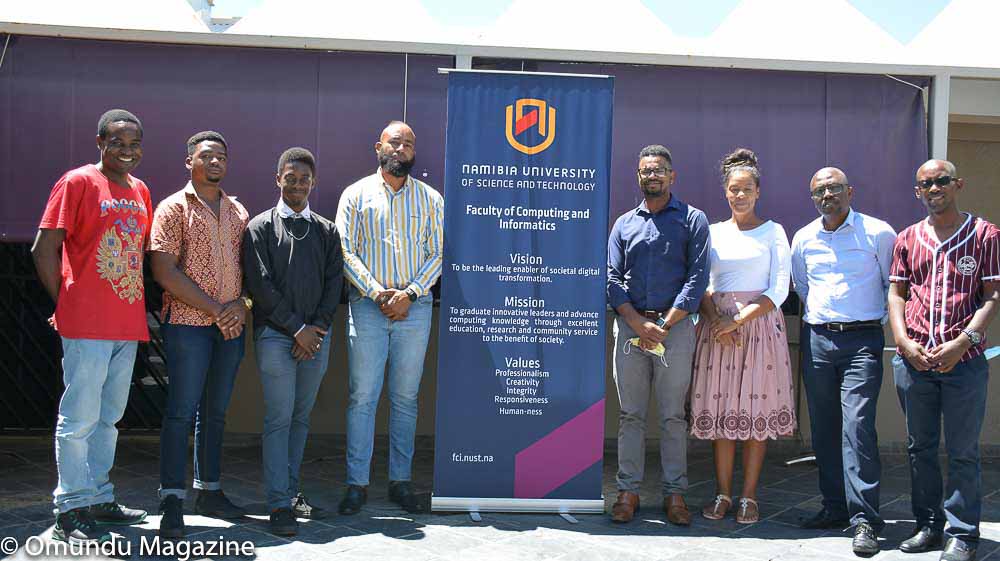Shopping cart
Recent Posts
Subscribe
Sign up to get update news about us. Don't be hasitate your email is safe.

The Faculty of Computing and Informatics is an elite group of computer experts who work dili- gently with students to bring many communities, busi- ness and specialist industries software, programmes and other solutions
Faculty of Computing and Informatics (FCI) at the Namibia Universi- ty of Science and Technology (NUST) started as a Department of In- formation Systems under the School of Commerce and Management back in its early years.
It evolved into the Department of Business Computing under the School of Engineering and Information Technology (1999), then as an autonomous School of Information Technology (2006) until it became known as the School of Computing and Informatics from 2014 and FCI from 2015 when the Polytechnic of Namibia was renamed as NUST.
FCI stands out at NUST because it was the first Faculty to implement two Masters and two PhD degrees by research only in 2014. Currently, FCI has 17 PhD, and 70 Masters by research students enrolled. FCI is renowned for innovative projects and active applied research and produces many research publications.
The Faculty focuses on four main research areas: Big Data, Indigenous Knowledge in Digital World, Smart and Secure Environment and Digital Transformation.
The Indigenous Knowledge in Digital World research cluster has been conducting research with the Otjiherero speaking communities from Opuwo, Ovitoto (Okomakuara), and Omaheke Region since 2008 (for more information, you can view the website: https://indiknowtech.nust.na).
We offer Bachelor, Bachelor Honours, Master and PhD degrees in various specialisations in Computer Science, Cyber Security and Informatics. FCI is proud to be part of
the NUST team rated as the preeminent higher education institution in Namibia (PMR Africa 2020) and has won countless local and global awards. WWFCI has been graduating Software Developers since its inception in 1999. Software is everywhere in most products we use daily from an alarm clock, calculator, in cars, microwaves and many more. So, the main question is what is software development? Software development involves the activities taken to build a software product/program, such as the software program on your cellular phone that allows you to save people’s contact information.
To come up with a simple contact list management program on your cellular phone you must learn the programming language (easily understood by human readable format) that, can then, often be converted into a machine language that the computer can understand. That is why when someone is studying to become a software developer, they must master at least a certain programming language.
FCI hosts several annual events to promote software development, such as the yearly National Programming Competition sponsored by MTC. Last year the fifth Namibia National High School and Tertiary Programming Competition was conducted online and attracted the highest number of participants (83) of which 55 were high school learners.
The Faculty started initiatives to collaborate with other units at NUST. Through these initiatives the Faculty has partnered with the Institutional Planning Office headed by Ms Tjivikua to develop computer games to entice NUST staff to know more about strategic planning. The computer games were developed as the project-based part of the Software Engineering 2 class facilitated by Mr Tjiraso. One of the best games named “STEP IT UP” was developed by a group of student namely; Keneth Nekundi, Shatipumba Kashume, Kuizikee Maendo, and Francis Emvula, part of the Software Engineering 2 class.
STEP IT UP is a three dimensional (3D) platform game, with qualities of a futuristic educational game for multiple platforms (Websites, Desktop and Android/IOS mobile devices). The game is set in a fantasy realm, where players must control and manoeuvre a character/avatar (a person) through various obstacles and platforms in order to reach that specific level’s checkpoint. Once the Player has reached a checkpoint, one of the five NUST Strategic Goals will be displayed as shown in the illustration below.

The User will complete all levels in the game to view all strate- gic goals. Once this is accomplished, the game will display the time it took to complete the game, the number of icons collected and strategic goals score. At this point the User can de- cide to exit the game or play another round to improve their score.In one of the many other success stories in software development, we will showcase a journey by our for- mer students, who specialized in developing software applications for the market.
The theme of one of the applications they devel- oped was to bring efficiency to the world of travel. It all started in October 2015, as a group of former software development students (Gervasius, Heinrich, Jonas, Leroy, Lamech, and Abrie) registered for a competition to solve issues around payments for public transport in Namib- ia. The result was “E-cab” – a cashless payment solution for taxis.
After knocking at some doors, looking for investors without success, it hit them that they needed a different model of funding to expand the idea. That’s when Tomas came on board and a joint venture, Intercity, was born. Over three years,the co-founders, Logic Plus Information Technologies and Nepat Trading took this simple idea and built it into Namibia’s leading carpooling platform, connecting thousands of people going the same way.
Intercity (https://www.intercity. com.na) is Namibia’s prominent mid and long-distance carpooling platform – a national trusted community of 30 thousand drivers and passengers. Through a mobile application, the platform connects people looking to travel long distances with drivers heading the same way, so they can travel together and share the cost. Intercity aims to become the go-to marketplace for shared road mobility in Africa.
Comments are closed